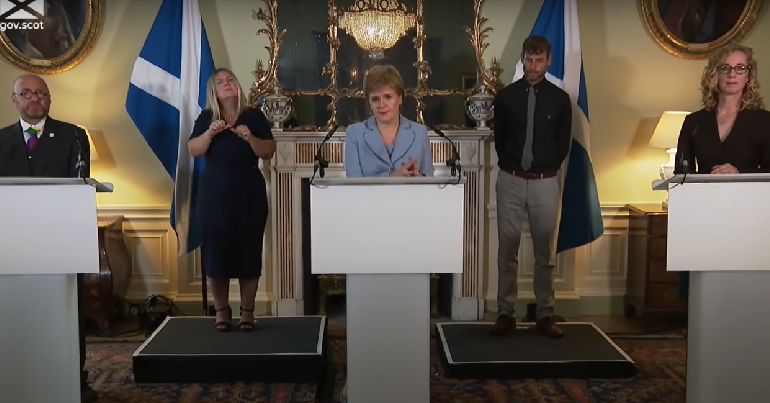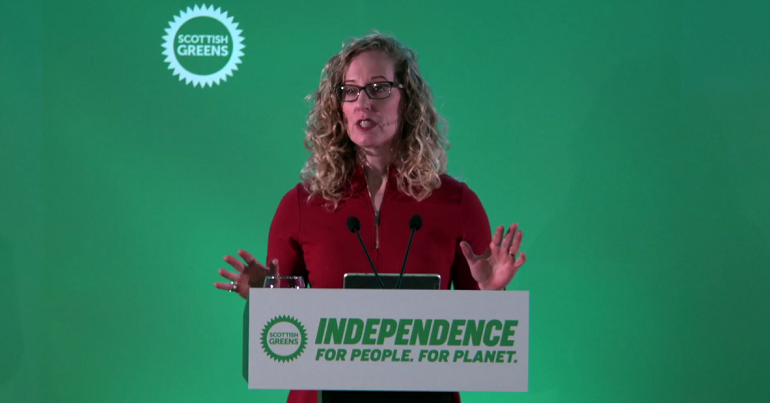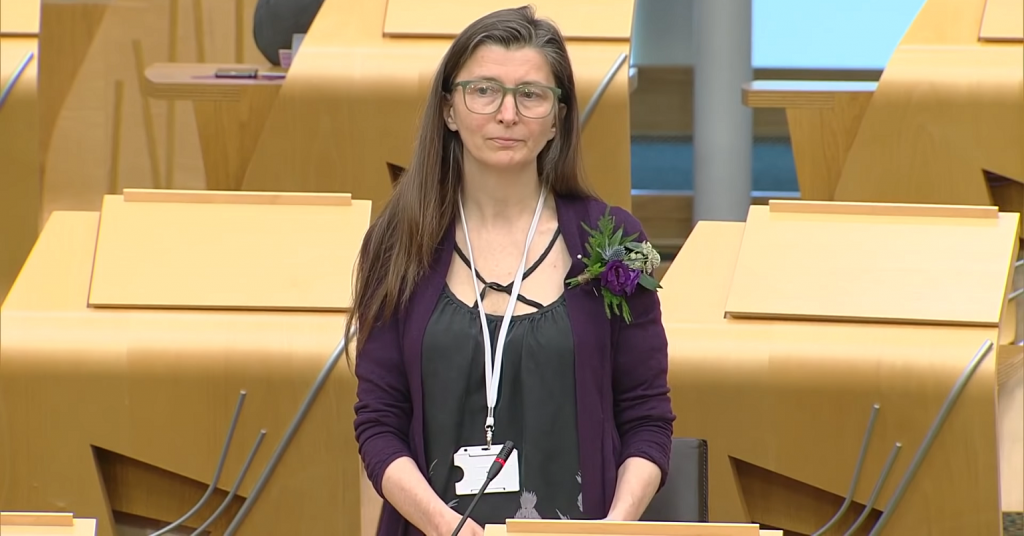It’s time for the Greens to reassess their role in the Bute House Agreement

It’s been two and a half years since the historic Bute House Agreement (BHA) was signed between the SNP-led Scottish Government and the Scottish Green Party (SGP). The agreement laid the groundwork for both parties to cooperate in parliament on delivering a shared “programme to build a greener, fairer, independent Scotland”, while maintaining separation on certain issues.
Crucially the agreement gave the Greens ministerial positions, an amazing accomplishment for the global Green movement. Not only would Greens hold actual power, with “Greens in the room” SGP members were hopeful that the very presence of Greens in government would slowly lead the SNP and Scottish Government further towards a more just, equal and environmentally friendly society.
After two and a half years it’s clear that not only we as the Greens have failed to move the SNP further to the left and toward environmentalism, the SNP seem even more keen to embrace neoliberal capitalism and climate change denial.
The progressive veneer wears off from the First Minister
When Humza Yousaf won the SNP leadership contest against Kate Forbes – whose conservative social views matched her conservative love for the capitalist orthodoxy – the vast majority of left-of-centre citizens in Scotland breathed a collective sigh of relief. While Yousaf is no leftist firebrand, his support for LGBT and abortion rights – as well as tentative support for wealth redistribution – gave hope to Green Party members that his government with the Greens could be truly transformative.
That hope quickly dissipated. Almost a year on from his election, Yousaf has embraced the SNP custom of promising to reform the unfair, regressive Council Tax and then doing nothing about it. This time-honoured tradition dates back to 2007, when the SNP promised to “abolish, council tax – and replace it with a local income tax” in their election manifesto.
While local councils are strapped for cash – struggling to keep basic services running – the SNP not only didn’t reform the tax, but froze it for 2024. The move was described by Ross Greer, the Scottish Greens’ finance spokesperson and MSP responsible for maintaining the Bute House Agreement, as favouring the rich more than the poor and leading to concerns over what effect it would “have on already-strained frontline public services if it is not properly funded”.
Not only was this a retreat from tackling the vested interest of rich home owners, it was also an insult to every Scottish Green Party member, including government ministers, who had to learn about the decision the day of the announcement breaking the “no surprise” clause in the Bute House Agreement.
The next gut punch came in December with the unveiling of the 2024/25 Scottish Budget. It is nothing short of brutal to read about areas closely aligned to Green values on the chopping block.
Funding for active travel was cut by £42 million. Scotland’s Just Transition Fund cut by £37.8m. The Future Transport Fund cut by £63m, and Scottish Forestry hit with a cut of £33.4m.
Housing was also hit. Scotland’s Housing Supply Programme slashed by £200m, making another Government target – one of building 110,000 affordable homes by 2032 – either an outright lie or a fantasy, leading Shelter Scotland to warn of the “devastating consequences that would come from this decision”.
Yet among this doom and gloom the government, whose apparent aim is to reduce car journeys by 20% by 2030, found an extra £200m for road maintenance, reaching a record £1 billion in Trunk Road Network funding. Meanwhile funding for rail, bus and ferry services was cut by £80m. Clearly the Scottish Government is not interested in going against the car lobby.
The government also tried to offset their cowardly decision to freeze Council Tax by increasing funding to councils by £144m, stating this would match a potential 5% tax increase. The Convention of Scottish Local Authorities (COSLA) has criticised that decision, stating that councils’ core revenue was already cut by £63m, so the extra funding would only cover a potential 2.8% tax increase. All this is ignoring the fact some councils would have been forced to consider tax hikes well above 5% to cover their needs.
Whatever progressive sheen was still on the first minister fell away a few weeks later as Humza Yousaf decided to double down on his disregard for both the planet and his coalition partners, and in his industrial policy for an independent Scotland speech proudly announced he’ll kick start Scotland’s economy with a £20bn investment fund financed in its entirety from oil revenues.
With 2023 being another year in a series of record-breaking temperatures, this announcement of continuous oil extraction can’t be described as anything other than climate change denial.
What do the Greens get out of the agreement?
The lack of vision and bravery shown by the First Minister is depressing but not surprising, as centre-left and right parties around the world continue to struggle finding solutions to mounting issues facing the neoliberal status quo.
So why are we the Greens still supporting him?
The simple answer is, with only seven MSPs, cooperating with the SNP in some capacity was the only realistic option for Greens to try pushing their agenda forward. This has been done successfully before the Bute House Agreement was signed, with Greens supporting the government in exchange for including progressive and environmental tweaks in its budget.
The crown jewel of this cooperation was the decision to allow everyone aged 21 or under free use of buses across Scotland. This has been a great success, drastically changing the lives of young people as well as cutting transport emissions.
While this cooperation was beneficial for both parties, an idea was brewing to change it into an official confidence and supply agreement. This would allow the SNP to secure a stable majority for the government and the Greens would become a party of government. The result was the Bute House Agreement discussed earlier.
There is no doubt that Scottish Greens have been able to achieve some successes in government.
In 2022 Lorna Slater announced “the era of coal is over” as the Scottish Government would be adopting a preferred policy position of no support for coal extraction in Scotland. This was a strong rebuttal to the UK Government, which planned to approve a new coal mine in Cumbria and went ahead with the decision at the end of that year.
This was followed by a number of announcements at the next year’s autumn conference: implementing a cruise ship levy, allowing young islanders to travel by ferry for free, extending the free bus pass to asylum seekers, exploring the introduction of a local carbon or land tax levy, and committing to deploy as much as six gigawatts of new solar power in the next six years.
The 2024/25 budget also contains a few nuggets of hope: £220m for active travel, financing free school meals and increasing the minimum wage for workers in adult social care and early learning and childcare, among the highlights. Income tax was raised by 1 percentage point for the two top income brackets, which along with income tax reform in 2018 – supported by the Greens during their time in opposition – will bring much needed extra income. Unfortunately the proposed tax rates are not even close to the promised 60% rate in 2016.
What is clear is that all those announcements, while positive in their own right, avoid confronting the entrenched interests of the rich and powerful, the ones hoarding wealth and leading us to climate catastrophe.
While income tax was slightly increased, there is no sign of a wealth tax or frequent travel levy. Also missing is a much needed Land Reform Bill, which would tackle the gross imbalance in land ownership. In Scotland an estimated 430 individuals own more than half the land in the country, a group including billionaires, aristocracy and even the ruler of Dubai.
All those ideas were included in the 2021 SGP manifesto but failed to materialise.
Another missed opportunity is the lack of rent controls, which were promised both in the Bute House Agreement as well as the Green election manifesto. While Greens did deliver a temporary rent cap in 2023 and eviction ban, helping hundreds of thousands of renters deal with the cost of living crisis, they will end in April 2024 and be replaced by very limited protections, where rent will still be tied to open market values – not enough to prevent landlords increasing rents by exorbitant amounts. This is hardly comforting news for renters condemned to engage with the neoliberal capitalist hellscape that is the Scottish housing rental market.
Finally the oil and gas industry has been given free reign to extract as much money as possible while destroying everything in its path. Outside of the aforementioned increase in road spending, the Scottish Government still hasn’t rejected a planning application lodged in 2022, by fossil fuel energy giants SSE and Equinor, to build a new and additional gas-fired plant next to the existing plant at Peterhead power station.
It’s possible that Humza Yousaf and his cabinet ministers still believe all the extra carbon pumped into the atmosphere would be negated by the magical fairy story of carbon capture, a technology that so far hasn’t worked anywhere in the world – but just might work in Scotland. That or his hesitancy might be explained by the 309 visits from oil lobbyists his government received from 2018, as reported by The Friends of the Earth.
The unfortunate summary of Greens being in government is a series of minor, progressive moves shuffling around the edges of the neoliberal status quo, without delivering any transformative changes – ones so crucially needed to significantly improve the lives of the people of Scotland.
An uncertain future
Two and a half years on from the signing of the historic Bute House Agreement, the optimism of what could be looks to have evaporated, making way to a growing frustration and disappointment at the government we remain a part of.
None of the Green successes we like to boast about will significantly transform the Scottish economy or society. With the war in Ukraine at a standstill, the start of another war in the Middle East, and the ever-accelerating climate crisis, it’s almost certain next year will be even tougher for our planet.
The people of Scotland put Greens in Holyrood to oppose neoliberalism and climate change denial. Paltry reforms cannot be a fair price for our continued support of a Scottish Government which pursues those very ends. It might be time for the Greens to reassess our current place in Scottish politics and in this government if we aim to achieve our goal of a more just, democratic and environmentally conscious world.
If the Greens won’t step up their game, push for radical changes and actually oppose the neoliberal status quo, next year members might again be told to celebrate budget cuts in housing and environment or cheer for slight policy adjustments.
I for one won’t be celebrating.
PS. We hope you enjoyed this article. Bright Green has got big plans for the future to publish many more articles like this. You can help make that happen. Please donate to Bright Green now donate to Bright Green now.




Leave a Reply